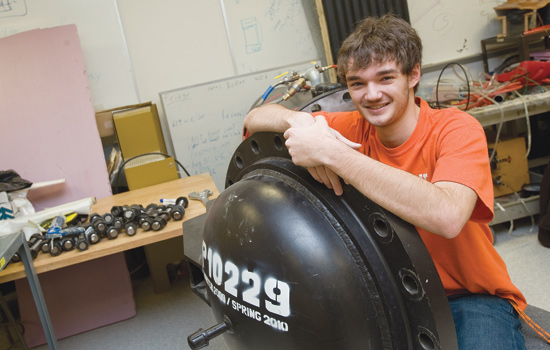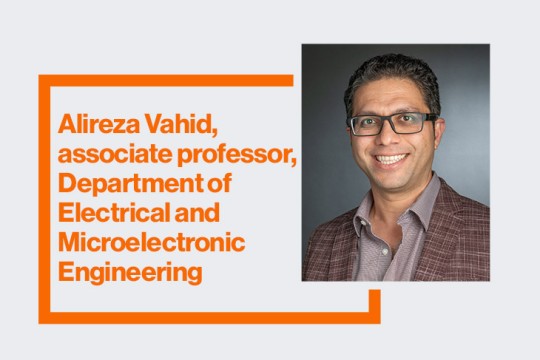Putting a new spin on telescope mirrors
Mike Every’s research garners interest from science community
A. Sue Weisler
Second-year physics major Mike Every is an amateur telescope maker with an idea for producing lightweight mirrors out of plastic instead of heavy glass.
Mike Every knows about grinding glass—and he doesn’t like it. The second-year physics major from Saugerties, N.Y., is an amateur telescope maker with an idea for producing lightweight mirrors out of plastic instead of heavy glass. His method of spinning liquid plastic into optically smooth disks avoids the tedious grinding process and promises to sheer off the cost of making glass mirrors.
Every is not the first to flirt with plastic mirrors. Scientists like the ones he met at the Meter-Class Astronomy Conference in Hawaii are exploring them to reduce the cost of building telescopes. Large, heavy glass mirrors take years to grind and dictate the size of a telescope. Every’s fresh approach deviates from current methods and is attracting attention from the scientific community.
“No one is doing it the way we are,” he says.
Every spins different combinations of liquid plastics in a vacuum chamber to eliminate turbulence in the surface of the cooling material. An apparatus he built spins the liquid into the shape of a concave mirror, a non-reflective blank mirror that can be coated with aluminum for reflectance.
Every was in high school when he began looking for an alternative to grinding glass telescope mirrors. The process of grinding a 14-inch mirror for the telescope he was building inspired him to find a faster grinding technique. Every learned about spin-casting liquid materials and thought the method could apply to making concave mirror-shapes out of plastic.
“As a liquid spins, it takes on a parabolic, or dish, shape, the necessary shape for a Newtonian telescope mirror, ” Every says. “If I could get a liquid to spin and take on that shape, then harden it, I could make a mirror from that.”
Every knows he’s onto something interesting and is working out the complications plastics present—the ripples and dents marring the surface of the cooling plastic.
“The issue is getting the right kind of plastic to set properly,” he says.
Every credits RIT’s Center for Student Innovation for helping him shift his pursuit of plastic telescope mirrors from a high school hobby to a primary research interest that has garnered attention from established scientists.
“Once I came to RIT in the fall of 2010, I took my idea to the Innovation Center where Jon Schull [interim director of the Center for Student Innovation] got me started with my own page on the Innovation Center’s website,” Every says. “I was granted a summer fellowship, and I made four six- to eight-inch mirror blanks, two of which were of good quality.”
Schull put Every in touch with Carl Lundgren, professor of manufacturing and mechanical engineering technology, who focuses on plastics and epoxies and who gave Every access to his lab. Lundgren and Michael Richmond, associate professor of physics, mentored Every during his summer fellowship.
Every flew to Mauna Kea, Hawaii, to present his research to the Meter-Class Astronomy Conference, Jan. 20-22, at the request of conference organizer Russell Genet from California Polytechnic State University. Genet contacted Every after reading the abstract to his paper, “Spin Cast Plastic Telescope Mirrors,” on the Internet. The abstract was posted online when Every’s work won “best paper for physics and astronomy” at the RIT Undergraduate Research Symposium last summer. Impressed by Every’s research, Genet also invited him to contribute a chapter to the book Telescope Mirrors.
“It was very thrilling to be depended on to provide accurate and helpful information to professional astronomers and telescope makers alike,” Every says. “The people who invited me to the conference were relying on me to provide them with helpful information as to how we can advance telescope technology. We threw ideas around and discussed how my process can be perfected, or at least improved. There were groups that were very optimistic and excited about the idea and there were a few people who were skeptical but open to the idea of using plastic instead of glass.”
His research on plastic telescope mirrors will likely continue to shape his undergraduate experience at RIT. Moving his work forward is a priority for Every, who hopes to win another summer fellowship.
“I’ve already had one of my mirror blanks aluminized,” he says. “This allowed me to further investigate any surface imperfections. The mirror is not telescope quality, but it is telling me a lot of information about what needs to be done to perfect the casting process.”















